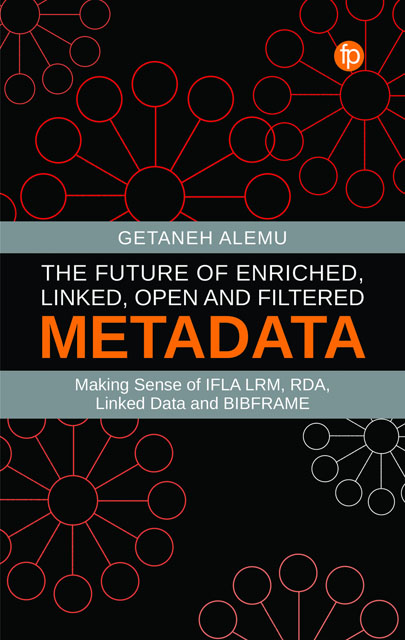 The Future of Enriched, Linked, Open and Filtered Metadata
The Future of Enriched, Linked, Open and Filtered Metadata Book contents
- Frontmatter
- Contents
- Figures
- Tables
- Code snippets
- About the Author
- Preface
- Acknowledgements
- Abbreviations
- 1 Introduction to Metadata
- 2 Metadata Strategies and Quality Indicators
- 3 Metadata Use Cases
- 4 Contemporary Metadata Principles
- 5 Enriched and Linked Metadata
- 6 Open Metadata
- 7 Filtered Metadata
- 8 FRBR, LRM and the Notion of Work
- 9 Resource Description and Access (RDA)
- 10 BIBFRAME: A New Metadata Framework
- 11 Crowdsourcing and User-Generated Metadata
- References
- Index
- Frontmatter
- Contents
- Figures
- Tables
- Code snippets
- About the Author
- Preface
- Acknowledgements
- Abbreviations
- 1 Introduction to Metadata
- 2 Metadata Strategies and Quality Indicators
- 3 Metadata Use Cases
- 4 Contemporary Metadata Principles
- 5 Enriched and Linked Metadata
- 6 Open Metadata
- 7 Filtered Metadata
- 8 FRBR, LRM and the Notion of Work
- 9 Resource Description and Access (RDA)
- 10 BIBFRAME: A New Metadata Framework
- 11 Crowdsourcing and User-Generated Metadata
- References
- Index
Summary
Overview
Metadata enriched and linked can be shared, exchangedand reused if it is made openly accessible usingopen protocols and formats. Linked and open metadataaddresses existing challenges in libraries andarchives where their collections are siloed frommost of the general web. The web of data rather thanthe web of documents allows cross-linking. Opennessalso fosters collaboration. Metadata opennessthrough open licences facilitates the sharing andreuse. In some cases, this may include use forcommercial purposes. Openness also encouragesbibliographic metadata use and adaptation byorganisations and individuals outside the libraryenvironment.
The principle of metadata openness
This principle, first and foremost, is aboutcollaboration, metadata sharing and exchange. Itappreciates that metadata comes at a cost: human,technical and financial. However, it advocates thatopen metadata formats and protocols are fundamentalfor information and knowledge exchange. This isespecially true of the web. Tapscott and Williams(2010) noted that ‘openness is associated withcandour, transparency, freedom, flexibility,expansiveness, engagement and access’. According tothem, current economic, social and technologicaltrends suggest that openness does not necessarilycorrelate to intellectual property infringements.They further contend that the culture of openness,and continued recognition of its potential benefits,has compromised the ‘conventional wisdom that sayscompanies compete by holding their most covetedresources close to the chest’ (Tapscott andWilliams, 2010). Contextualising this to libraries,Miller (2005) argues that the principles of Web 2.0are predicated on the notion of liberating data,which in turn allows data to be ‘exposed,discovered, and manipulated’ in a multitude of ways,thereby creating unimaginable possibilities forrepurposing and reusing the data. In terms of recenttechnologies, whilst Linked Data can be made usablewithout it necessarily being open (Cobden et al.,2011; Shadbolt, 2010; W3C, 2011), as Berners-Lee(2010) emphasises, opening data brings forthnumerous benefits to society. In his TedTalk,Berners-Lee (2010) reiterates his vision of LinkedData by citing several international, regional andcommunity-based initiatives and projects that haveadopted Linked Data principles and thereby madetheir data openly available using URIs and RDFtechnologies. As Berners-Lee re-emphasises, opendata can be reused in an unimaginable number ofways.
- Type
- Chapter
- Information
- The Future of Enriched, Linked, Open and Filtered MetadataMaking Sense of IFLA LRM, RDA, Linked Data andBIBFRAME, pp. 145 - 152Publisher: FacetPrint publication year: 2022


